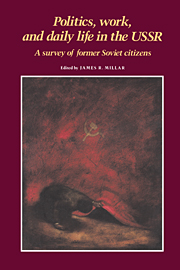Book contents
- Frontmatter
- Contents
- Foreword
- List of contributors
- PART I INTRODUCTION
- PART II POLITICS: SOURCES OF REGIME SUPPORT
- 3 Politics, generations, and change in the USSR
- 4 Political beliefs of the Soviet citizen: sources of support for regime norms
- 5 The attentive public for Soviet science and technology
- PART III WORK: ECONOMIC/DEMOGRAPHIC TRENDS
- PART IV LIFE: SOCIAL STATUS, ETHNIC RELATIONS, AND MOBILIZED PARTICIPATION
- Appendix A The SIP General Survey sample
- Appendix B Response effects in SIP's General Survey of Soviet emigrants
- Glossary
- General bibliography of Soviet Interview Project publications
- Index
3 - Politics, generations, and change in the USSR
Published online by Cambridge University Press: 21 March 2010
- Frontmatter
- Contents
- Foreword
- List of contributors
- PART I INTRODUCTION
- PART II POLITICS: SOURCES OF REGIME SUPPORT
- 3 Politics, generations, and change in the USSR
- 4 Political beliefs of the Soviet citizen: sources of support for regime norms
- 5 The attentive public for Soviet science and technology
- PART III WORK: ECONOMIC/DEMOGRAPHIC TRENDS
- PART IV LIFE: SOCIAL STATUS, ETHNIC RELATIONS, AND MOBILIZED PARTICIPATION
- Appendix A The SIP General Survey sample
- Appendix B Response effects in SIP's General Survey of Soviet emigrants
- Glossary
- General bibliography of Soviet Interview Project publications
- Index
Summary
Given the turbulence of Soviet history since 1917, students of Soviet politics have looked to the rise of new generations as a key source of change in the USSR. Upheavals from the Revolution and civil war, through collectivization to World War II and de-Stalinization, all created markedly divergent conditions in which succeeding generations have come of age. Life experiences and opportunities vary so much that new generations – among the leadership and the population alike – should have different political values and expectations of the Soviet system. If formative experiences shape adult political orientations, the terror of the 1930s should have left its mark on the Stalin generation, just as the thaw of the post-Stalin era should have created a less fearful and more critical cohort. Thus, the process of generational replacement could give a different cast to the Soviet political landscape. To borrow Karl Mannheim's (1972) phrase, generational differences may be fundamental guideposts for understanding social and political change in the USSR.
Yet we have little empirical evidence on how the members of succeeding age groups vary in their relationship to the Soviet system – how the regime engages the members of each generation, or how they respond. Nor has it been possible to disentangle the political impact of rising educational levels and occupational attainments from the effects of generational replacement.
This chapter is a first attempt to explore the political “generation gap” at the individual level, using interviews with recent emigrants conducted by the Soviet Interview Project to assess age cleavages in political involvement.
- Type
- Chapter
- Information
- Politics, Work, and Daily Life in the USSRA Survey of Former Soviet Citizens, pp. 61 - 99Publisher: Cambridge University PressPrint publication year: 1987
- 19
- Cited by



